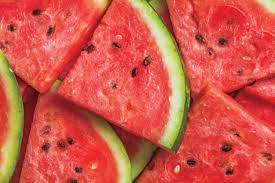Scientists at the Kwame Nkrumah University of Science and Technology (KNUST) have warned that children are at a higher risk of developing cancer by consuming watermelon.
This comes after their findings revealed unacceptable levels of pesticide residues like DDT in watermelon on the market in the Mampong Municipality of the Ashanti Region.
Although the organochlorine pesticides are banned for agricultural use, some farmers are using them, a situation which has adverse health effects on consumers.
In an interview with JoyNews, on Thursday, the lead scientist, Prof Nathaniel Owusu Boadi, revealed that since children consume the fruit more, they stand the risk of developing cancer.
“We looked at three of them; banana, pineapple and watermelon. For watermelon, the risk of consumption for adults was low, whereas that for infants was alarmingly high.
“We say alarmingly high because the factor that we got was far greater than one, which means that it is alarming. Also, when we looked at the carcinogenic risk, we also realised that the children are at risk of having cancer by consuming watermelon because of the level of organochlorine pesticide that was found [in the fruit],” he explained.
The scientists assessed the levels of organochlorine pesticide residues in fruits and determine the potential risk associated with the exposure to these pesticides.
For the study, the researchers used about 120 fruits from five communities in the Mampong Municipality of the Ashanti Region.
The results showed that although the levels of the pesticides were undetectable in bananas and pineapples, they were above the permissible limits in watermelons, which pose long-term risks to the consumer, especially children.
“Levels of methoxychlor, Aldrin and gamma-hexachlorocyclohexane (HCH) exceeded the maximum residue limits in watermelon.
“Estimated health risk revealed that Aldrin in watermelon could pose potential toxicity to the consumer. Estimated average daily intake for Aldrin was above the acceptable average daily intake.
“The combined health risk due to consumption of each fruit variety was minimal but, the overall health risk index due to consumption of all the fruits was higher than 1, indicating potential health risk to consumers,” the researchers added.
They have called for a regular monitoring of pesticide residue in fruits and the appropriate actions taken to protect consumer health.
Latest Stories
-
EPA says lead-based paints are dangerous to health, calls for safer alternatives
37 minutes -
Queenmother calls on President-elect Mahama to appoint more women in his government
3 hours -
Atletico Madrid beat Barcelona to go top of La Liga
3 hours -
Usyk breaks Fury’s heart with points win in rematch
3 hours -
Ghana-Russia Centre to run Russian language courses in Ghana
8 hours -
The Hidden Costs of Hunger: How food insecurity undermines mental and physical health in the U.S.
9 hours -
18plus4NDC marks 3rd anniversary with victory celebration in Accra
12 hours -
CREMA workshop highlights collaborative efforts to sustain Akata Lagoon
12 hours -
2024/25 Ghana League: Heart of Lions remain top with win over Basake Holy Stars
13 hours -
Black Queens: Nora Hauptle shares cryptic WAFCON preparation message amid future uncertainty
13 hours -
Re-declaration of parliamentary results affront to our democracy – Joyce Bawah
13 hours -
GPL 2024/25: Vision FC score late to deny Young Apostles third home win
14 hours -
Enhancing community initiatives for coastal resilience: Insights from Keta Lagoon Complex Ramsar Site Workshop
14 hours -
Family Health University College earns a Presidential Charter
14 hours -
GPL 2024/25: Bibiani GoldStars beat Nsoatreman to keep title race alive
14 hours

